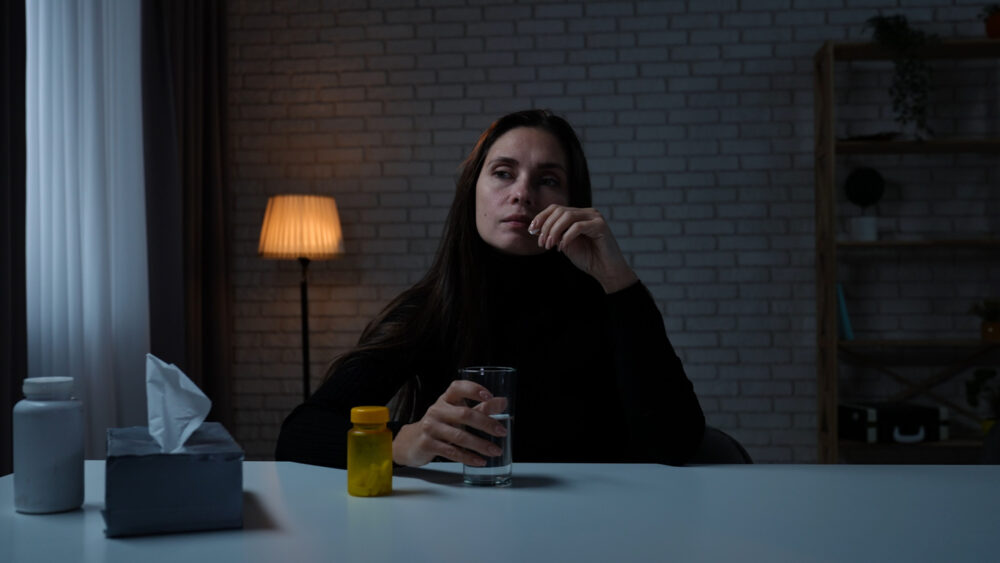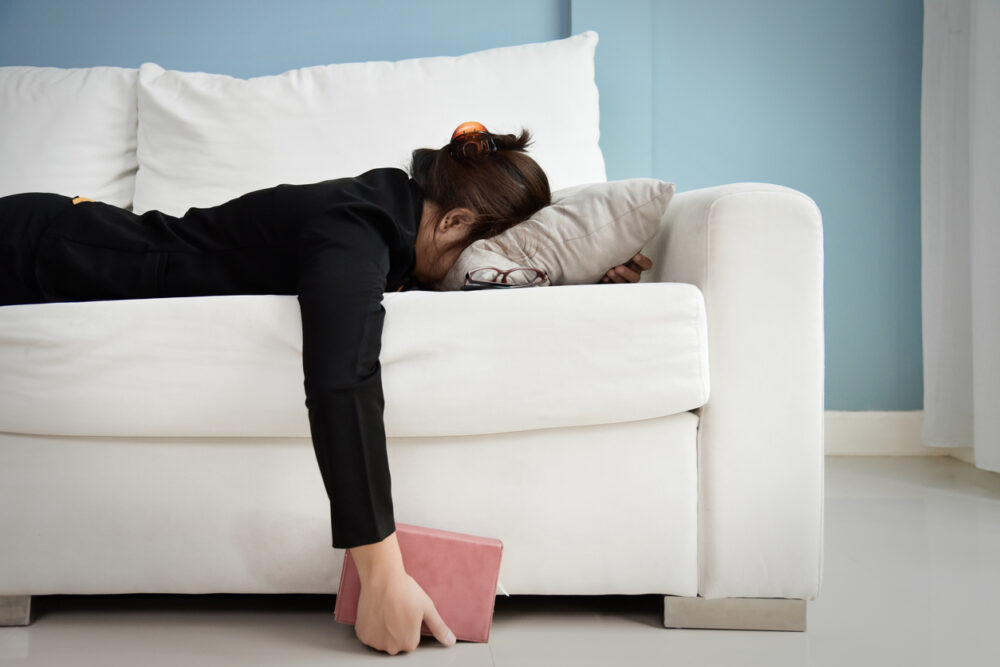Your back hurts, your energy’s gone, and somehow you’re still expected to thrive.

In theory, the twenties are supposed to be a golden decade—full of stamina, ambition, and all the flexibility the body and schedule can offer. But for many, this phase feels more like an early onset of something else entirely. There’s a strange overlap happening: aches that shouldn’t be there, health concerns once considered “decades away,” and a creeping sense of physical limits arriving far ahead of schedule.
What was once written off as occasional stress now feels more permanent. Bodies protest more than expected. Recovery takes longer. The pressure to keep up with constant demands doesn’t ease, even as energy fades. These aren’t just signs of being overworked—they’re signs that the experience of young adulthood today is laced with symptoms that resemble a much later stage of life. These first five shifts reveal how common it’s become to feel older than the calendar says.
1. Waking up sore becomes a daily routine.

Stiff necks and aching backs used to belong to people twice this age. Now, they show up without warning after an ordinary night of sleep. Professionals at Atlantic Spine Center explain that improper sleep positions and unsupportive mattresses are frequent culprits behind neck and back pain, especially in younger adults. And unlike childhood discomfort, this kind lingers, often making its presence known before even getting out of bed. It can feel strange to complain about pain when nothing obvious caused it, but it’s become more common.
Simple movements like turning the head or bending over to tie shoes now come with hesitation. It starts subtly, but builds fast, changing how the day begins and how it ends. What used to be an afterthought—rest—suddenly has consequences.
2. Foods that used to be easy now trigger entire health spirals.

Late-night snacks, greasy takeout, questionable leftovers—none of it used to matter. But now, digestion comes with conditions. Adda Bjarnadottir notes in Healthline that high-fat, high-sodium foods like pizza can contribute to bloating and digestive distress, especially in adults with growing sensitivities. Even foods that were once favorites can cause surprising reactions.
This shift isn’t always dramatic, but it’s persistent. Meals are approached with more caution, ingredient labels suddenly matter, and conversations about probiotics and elimination diets become weirdly familiar. There’s a growing sense that the body is rejecting its former habits, one meal at a time—and figuring out how to adapt is rarely straightforward.
3. Every plan comes with a recovery cost.

Spontaneity used to be part of the fun. But now, even small outings can require careful planning—not just for time, but for energy. Researchers at the National Institute on Aging have linked chronic social stress to changes in immune function that may explain why recovery from events like parties or travel feels more draining with age. Activities are weighed against how long it will take to bounce back.
This isn’t laziness or overreaction. It’s a new reality where the body feels like it has a limited budget, and everything costs more than it used to. Even joyful things—concerts, long walks, road trips—now require prep and recovery strategies. It’s a different rhythm of living, one that feels oddly premature.
4. Doctor visits start to feel a little too familiar.

Sitting in waiting rooms used to feel like something reserved for older relatives. But now, those same chairs are occupied more often. Not because of dramatic diagnoses, but because of strange recurring symptoms, low-grade pain, or questions that never seem to have clear answers. Insurance gets more complicated. Co-pays become a factor in decision-making. More unsettling is the way conversations start to shift. Talk of inflammation, stress responses, or long-term impacts starts to echo language heard from older adults.
The sense of being “too young for this” doesn’t always match what the body is reporting. And sometimes, it’s hard to get taken seriously—because youth isn’t always enough to prove that something isn’t wrong.
5. Rest starts to feel like a guilty pleasure.

Relaxation used to happen without internal negotiation. But now, rest feels conditional. It’s no longer part of the day—it’s something that needs to be earned. Hours are tallied, to-do lists scanned, and even when the body screams for stillness, the mind pushes forward with productivity guilt.
This shift doesn’t just affect sleep—it seeps into how days are structured and how energy is spent. Rest is rationed like a resource, sometimes delayed until it’s no longer effective. And the more pressure that builds, the harder it becomes to listen to fatigue without judgment. It’s a quiet form of self-denial, packaged as ambition or discipline, but it leaves little room for recovery.
6. Standing for too long starts to feel like a workout.

It’s a strange thing to realize, but extended standing—at a concert, in line, or while cooking—can suddenly become a strain. Feet start to ache, knees feel tight, and there’s a dull fatigue that creeps into the lower back. It’s not dramatic enough to sit down immediately, but it builds. And it wasn’t like this a few years ago.
The shift isn’t always about fitness or posture. Sometimes it’s just the wear of daily life: unsupportive shoes, old injuries, or muscle tension from stress. Whatever the cause, that sense of physical depletion from a basic task can be disorienting. Taking breaks becomes essential. And noticing how good it feels to finally sit down isn’t just relief—it’s a reminder that the body doesn’t recover as quickly as it used to.
7. Mental fog becomes harder to ignore.

Focus used to come easily. Now, it slips through the cracks. There’s a fuzziness that makes reading, planning, or even finishing a thought feel more effortful. Some call it brain fog, others chalk it up to stress—but whatever the name, it starts interfering with even basic daily routines.
It’s not about forgetfulness, exactly. It’s more like a constant low-level static in the mind. Conversations get harder to follow. Tasks blur together.
Multitasking, once a strength, becomes overwhelming. This kind of mental fatigue often arrives quietly and stays longer than expected. It doesn’t always mean something’s wrong—but it does signal that something has changed. And it makes everyday life more draining than it used to be.
8. Pain relief becomes part of the regular routine.

A bottle of ibuprofen used to last forever. Now, it’s tucked into bags, nightstands, and glove compartments. Whether it’s for tension headaches, period cramps, sore knees, or back stiffness, pain relief starts showing up more frequently.
It’s not always intense pain—but it’s persistent enough to manage regularly. The casual use of heating pads, ice packs, or even Epsom salts begins to blur into daily life. So do stretches learned from online videos or prescribed by a physical therapist. It’s not just about occasional discomfort—it’s about maintenance. Staying functional starts to feel like a low-level project, and even if the aches are manageable, their consistency feels like an unexpected weight.
9. Energy levels feel permanently set to low.

Sleep helps, but not enough. A good night’s rest used to guarantee a solid day. Now, it’s not a sure thing. Mornings feel heavy. Afternoons drag. Even without intense activity, the baseline is lower than expected. It’s like the body’s battery refuses to charge above 60 percent.
This isn’t the kind of tired that disappears with caffeine or an extra hour of sleep. It’s a layered fatigue—part mental, part physical, and often resistant to quick fixes. Some days it lifts, but it always returns. And trying to pinpoint the cause doesn’t help much. There’s no single reason, just a quiet, lingering drain that makes it hard to fully show up for anything.
10. Everyone around you seems just as wrecked.

What used to feel like a personal issue starts to look like a generational pattern. Friends and peers are dealing with the same symptoms: chronic pain, random injuries, gut issues, fatigue. It becomes a running joke—everyone in their twenties moving like they’re twice their age—but the humor can’t hide how real it’s become. This collective exhaustion doesn’t come from laziness. It comes from living in a time where basic needs are harder to meet, where rest is scarce, and where stress is constant.
What used to be seen as resilience starts to look more like adaptation to an unsustainable pace. And while it’s comforting not to feel alone in it, it’s also sobering to realize how widespread the weariness has become.